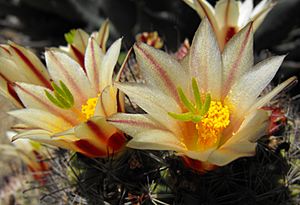Strawberry cactus facts for kids
Quick facts for kids Strawberry cactus |
|
|---|---|
 |
|
| Scientific classification | |
| Genus: |
Mammillaria
|
| Species: |
dioica
|
The Mammillaria dioica, often called the strawberry cactus, is a cool plant that grows in dry, desert areas. It's also known as the California fishhook cactus or strawberry pincushion. In Spanish, people call it biznaga llavina. This cactus is special because it can have different types of flowers on one plant, and its bright red fruits are tasty!
Contents
Where It Grows
The strawberry cactus likes warm, dry places. You can find it in the western Colorado Desert in places like Anza-Borrego Desert State Park. It also grows in Southern California's coastal areas. This cactus is also found in Baja California and Baja California Sur in México. It can grow from about 3 meters (10 feet) up to 457 meters (1,500 feet) above sea level.
What It Looks Like
The Mammillaria dioica has short, firm bumps called tubercles. Each tubercle has spines on its end. Most of these spines are whitish and straight. But, each bump also has a longer spine in the middle. This central spine is usually a bit curved and dark.
Flowers and Fruits
A single strawberry cactus plant can have both male and female flowers. Sometimes, it can even grow flowers that have both male and female parts! These flowers bloom from mid-spring to mid-summer. They are white or cream-colored. They can be small, about 10 millimeters (0.4 inches) long, or larger, up to 30 millimeters (1.2 inches) long.
After the flowers, the plant grows bright red fruits. These fruits are shaped like an egg, often thicker at one end. They are safe to eat and taste like a mix between a strawberry and a kiwi! Inside the fruits are tiny black seeds, about 0.6 to 0.8 millimeters long.
How People Use It
The Kumeyaay people, who live in Baja California and Southern California, used to eat the raw fruits of the strawberry cactus. It was an important food source for them.
Growing This Cactus
The Mammillaria dioica is grown by special plant nurseries and botanical gardens. People buy these plants for their homes and gardens. This cactus needs soil that drains water very well. Because of this, it is often grown in pots or in raised garden beds. It's a great plant for drought tolerant gardens because it doesn't need much water.
See also
 In Spanish: Mammillaria dioica para niños
In Spanish: Mammillaria dioica para niños

